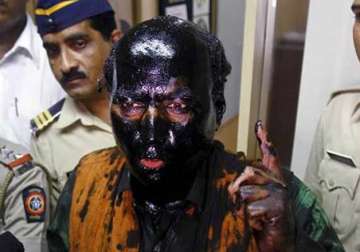Hitting back, India says don't need Pak lecture on pluralism
New Delhi: India today lashed out at Pakistan for "lecturing" it on pluralism after Islamabad expressed concern over attempts to disrupt functions of its prominent personalities, and asserted that non-practice of terrorism was central to

New Delhi: India today lashed out at Pakistan for "lecturing" it on pluralism after Islamabad expressed concern over attempts to disrupt functions of its prominent personalities, and asserted that non-practice of terrorism was central to the betterment of the Indo-Pak relationship.
"(As if) Pakistan is the embodiment of tolerance, pluralism. India does not need to take a lecture from Pakistan. If India has a shortcoming, it is capable of looking after it," top official sources said.
The Indian reaction came after Pakistan Foreign Office said it "noted with concern attempts to disrupt functions organised in respect of prominent Pakistani personalities on visit to India" while referring to cancellation of a cultural event by gazal maestro Ghulam Ali and attempts to disrupt a function in Mumbai organised for its former Foreign Minister Khurshid Kasuri.
"There is a need to ensure that such incidents do not reoccur," the Pakistan Foreign Office said.
However, the sources said India still remains interested in NSA-level talks as per Ufa understanding but made it clear that terrorism cannot be an instrument of statecraft.
"A lot of what has not gone as per Ufa is because of Pakistan's domestic politics.... They are also having some disturbance. There are non-elected players in play. The dynamics of it is both complicated and less transparent.
Read Also: Pakistan voices concern over campaign against its prominent personalities in India
"The issue is that there has to be a recognition that terrorism cannot be an instrument of statecraft and you cannot say it was only Gurudaspur attack, why are you overreacting or an attack on BSF, why are you overreacting.
"It cannot be a routine way. There has to be recognition that non-practice of terrorism is central to the betterment of the relationship. If they are in denial of that (that is an issue). One country cannot resort to terrorism as a way of pressurising the other. It is not asking for too much," they said.
On Pakistan leaders meeting Kashmiri separatist Hurriyat leaders, the sources said India has an issue if the manner of consultation or discussions or whatever way they interact with the Hurriyat was done in a manner where they are projected as a third party.
The officials sources also maintained that India was “open” to a meeting between its NSA and his Pakistani counterpart on the sidelines of the UN General Assembly last month but Pakistan was not “that open and that is why it did not happen”.
“There still remains interest in NSA-level talks. Even though, it (Ufa agreement) said the talks would happen in New Delhi. But India was ready to have in New York. The problem is that when another party starts conditioning it, that it will only talk if they are allowed to meet Hurriyat.... “You cannot take away the centrality of terrorism in the current state of the relationship. They did not dispute it.
But obviously their domestic politics took them in a different direction from the Ufa. Politics in some countries are not played only by politicians. We were still open to having NSA-level talks and there was no lack of clarity on that,” the sources said.
It is understood that Pakistan had pushed India for a meeting between their foreign ministers as a pre-condition for talks between their National Security Advisors which was turned down by the Indian side.
The sources also asserted that it was also about whether Pakistan accepts or not that practising terrorism is an obstacle to better India-Pakistan relationship. “If you do accept it, there is logical flow out of it. If you don't, it goes elsewhere. And clearly in New York we were not on Ufa page, so it did not happen,” they added.
The sources noted that after the release of Zakiur Rehman Lakhvi, the Mumbai attack mastermind, the sentiment was that it was very difficult to have talks with Pakistan when he is walking around free there.
“Therefore, we needed some kind of serious discussion on terrorism and obviously the appropriate people were NSAs,” they added.